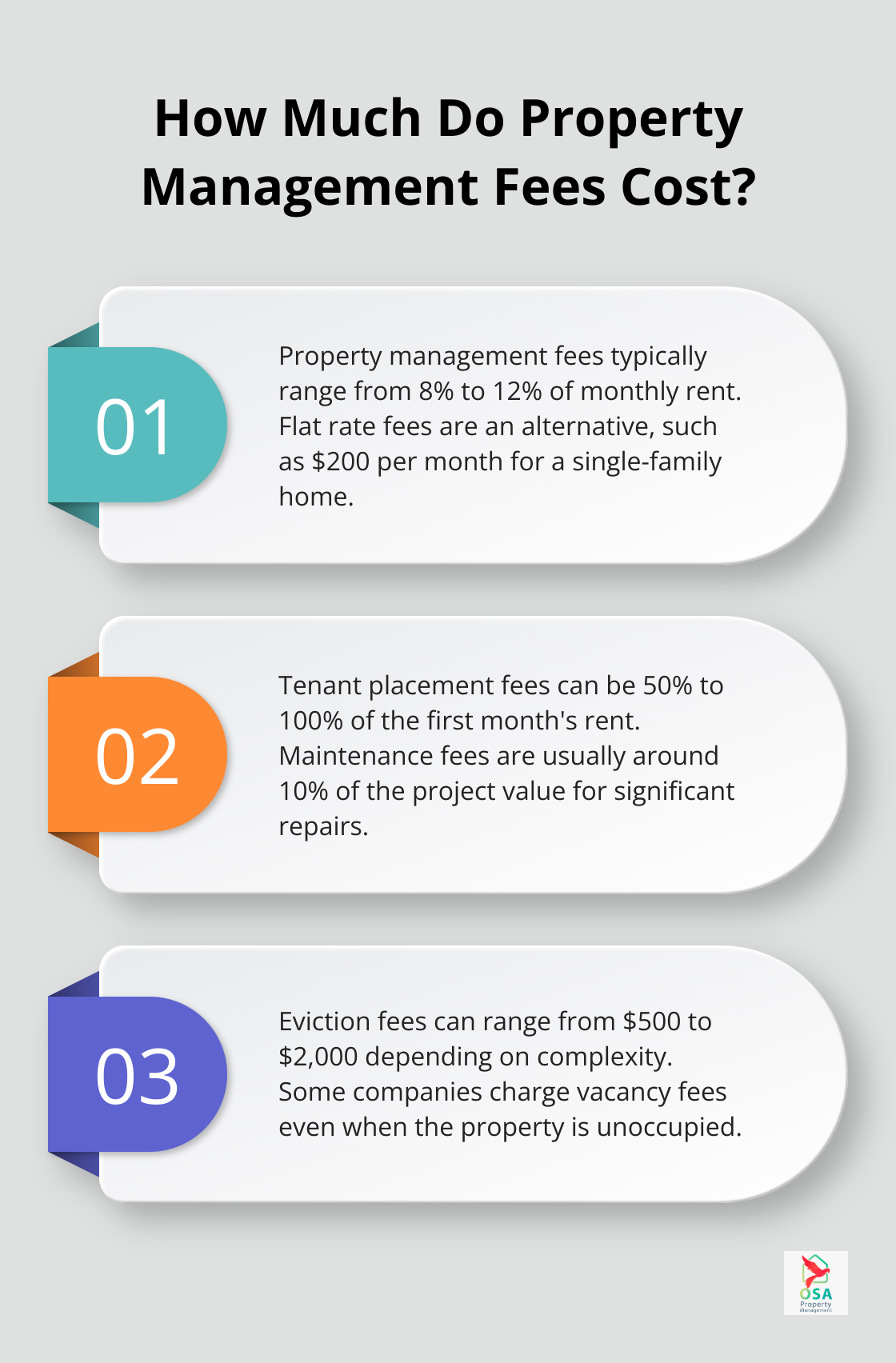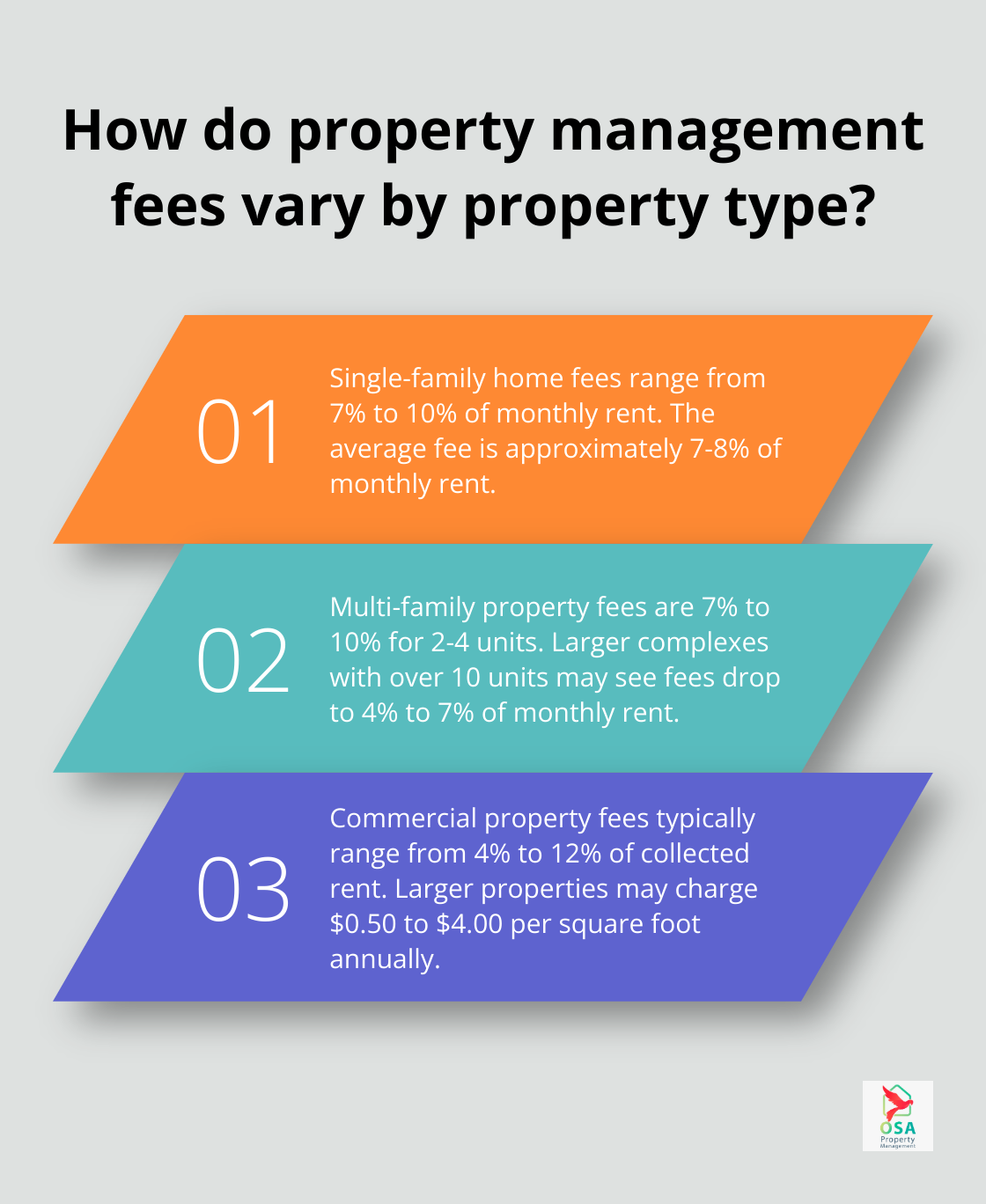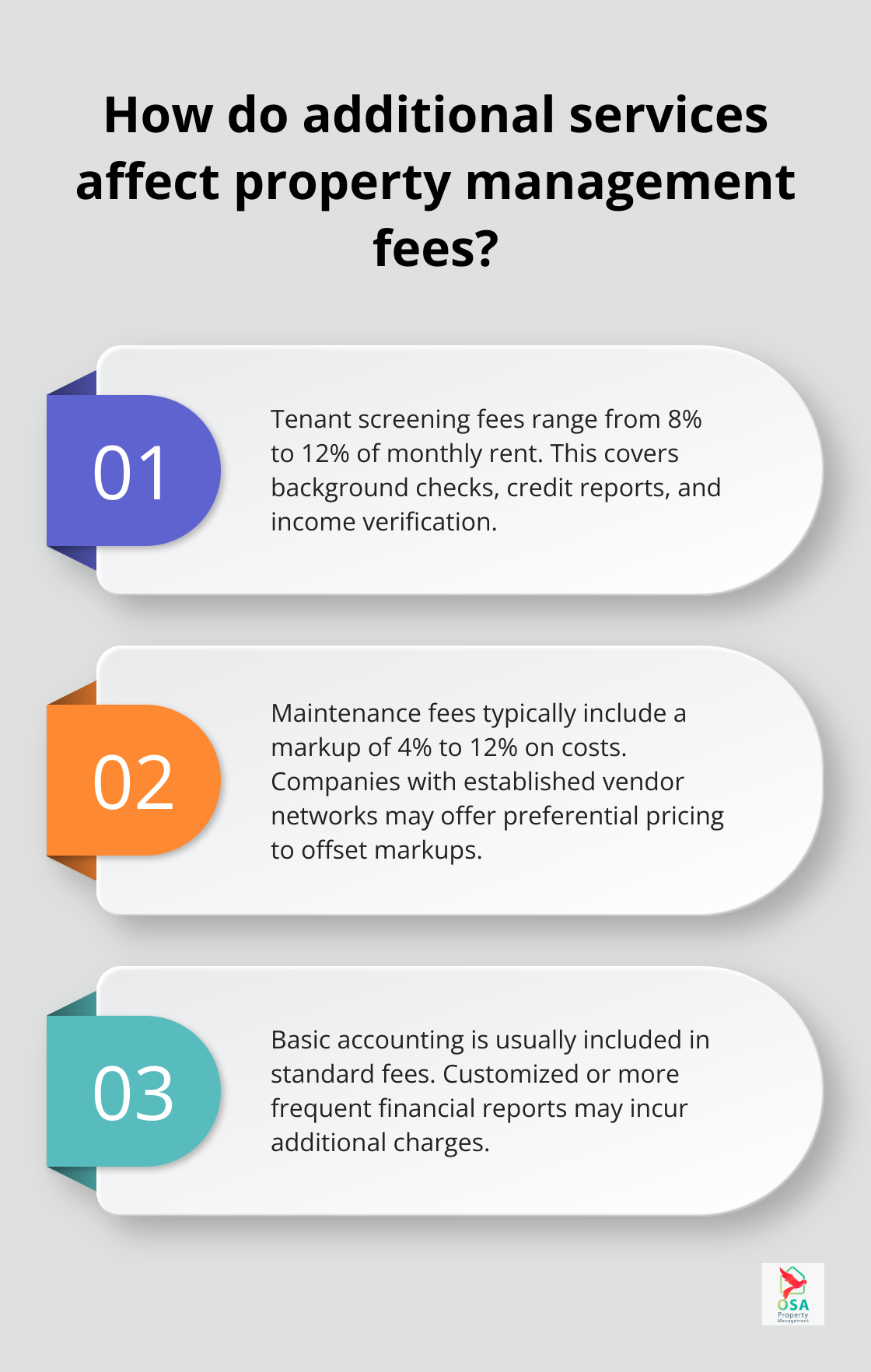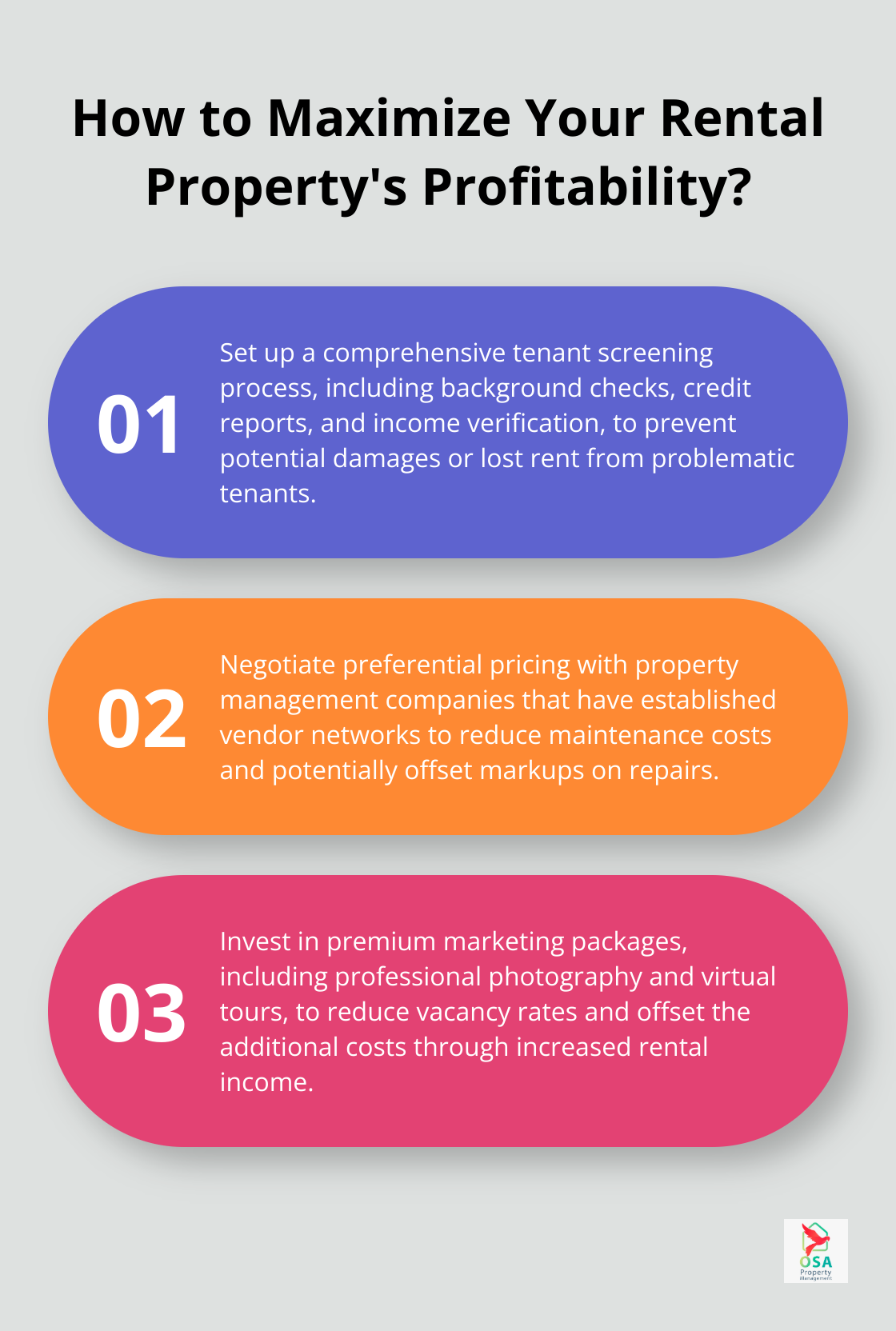At Osa Property Management, we often field questions about property management fees. Many landlords wonder: What is the average property management fee for rental properties?
This blog post will break down the typical fee structures, explore how they vary across different property types, and discuss additional services that may impact costs. We’ll also provide tips to help you choose the right property management company for your needs.
What Are Property Management Fees?
Definition and Importance
Property management fees represent the costs associated with hiring a professional company to oversee and maintain rental properties. These fees play a significant role in a landlord’s financial planning and can impact their overall return on investment.
Types of Fee Structures
Property management companies typically employ two main fee structures:
- Flat Rate Fees: These involve a set monthly charge regardless of the property’s rental income. For instance, a company might charge $200 per month to manage a single-family home.
- Percentage-Based Fees: These fees are calculated as a portion of the monthly rent collected. The National Association of Residential Property Managers reports that these fees usually range from 8% to 12% of the rent.
Factors Influencing Fee Structures
Several elements can affect the fee structure and rates charged by property management companies:
- Property Type: Single-family homes often have different fee structures compared to multi-unit buildings or commercial properties.
- Location: Urban areas typically command higher fees due to increased demand and higher property values.
- Property Condition: Well-maintained properties may incur lower management fees due to reduced maintenance needs.
- Services Provided: Comprehensive management services (including 24/7 emergency response) may lead to higher fees.
Hidden Costs to Consider
When evaluating property management fees, landlords should be aware of potential hidden costs:
- Tenant Placement Fees: Some companies charge additional fees for tenant placement, which can range from 50% to 100% of the first month’s rent.
- Maintenance Fees: These fees (typically around 10% of the project value for significant repairs) can add up quickly.
- Vacancy Fees: Some management companies charge fees even when the property is unoccupied.
- Eviction Fees: These can range from $500 to $2,000, depending on complexity and legal representation required.
To avoid surprises, always request a comprehensive breakdown of all potential charges before signing a contract with a property management company.

As we move forward to explore average property management fees for different property types, it’s important to keep these fee structures and potential hidden costs in mind. Understanding these elements will help you make an informed decision when choosing a property management company that aligns with your financial goals and property needs.
How Do Property Management Fees Vary by Property Type?
Single-Family Homes
Property management fees for single-family homes typically range from 7% to 10% of the monthly rent collected. The average fee for single-family homes is approximately 7-8% of monthly rent.

These fees usually cover basic services such as rent collection, maintenance coordination, and tenant communication. Additional services like tenant placement or eviction handling often incur extra charges.
Multi-Family Properties
Multi-family properties, including apartment buildings or duplexes, often benefit from economies of scale. As a result, management fees for these properties tend to be lower on a per-unit basis compared to single-family homes.
For smaller multi-family properties (2-4 units), fees typically range from 7% to 10% of the monthly rent collected. Larger apartment complexes with more than 10 units may see fees drop to 4% to 7% of monthly rent.
While the percentage may be lower, the total dollar amount can be higher due to the increased rental income from multiple units. Some management companies offer tiered pricing based on the number of units managed.
Vacation Rentals
Vacation rental properties often command higher management fees due to their more intensive management needs. These properties require frequent turnover, more marketing efforts, and often need to be furnished and maintained to a higher standard.
Management fees for vacation rentals can vary widely depending on the specific services provided and the location of the property.
Commercial Properties
Commercial property management fees typically fall between residential and vacation rental fees. On average, these fees range from 4% to 12% of the collected rent. However, the fee structure for commercial properties can be more complex, often including base fees plus additional charges for services like lease negotiations or property improvements.
For larger commercial properties, management companies may charge a flat fee based on the square footage of the property. This fee can range from $0.50 to $4.00 per square foot annually (depending on the property type and location).
When considering property management services, it’s important to look beyond just the percentage or flat fee. The value provided by a management company often outweighs the cost, especially when factoring in time saved, reduced vacancies, and professional handling of tenant issues.
To make an informed decision, ask potential management companies for a detailed breakdown of their fee structure and included services. This transparency will help you understand the full scope of services offered and ensure you’re getting the best value for your investment.
Now that we’ve explored how property management fees vary across different property types, let’s examine the additional services that can impact these fees and what they mean for property owners.
What Additional Services Impact Property Management Fees?
Property management fees often extend beyond basic rent collection and tenant communication. Additional services can significantly impact the overall cost structure. Property owners must understand these services and their associated fees to make informed decisions.
Tenant Screening and Placement
Effective tenant screening is a key component of successful property management. Many companies charge a separate fee for this service, typically ranging between 8% to 12% of the monthly rent for residential units. This fee covers background checks, credit reports, and income verification. While it may appear expensive, thorough screening can prevent thousands in potential damages or lost rent from problematic tenants.

Some management companies include tenant placement in their standard fee structure. This approach can prove more cost-effective for property owners in the long run, especially those with high tenant turnover rates.
Maintenance and Repairs
Maintenance fees can greatly affect your bottom line. Most property management companies add a markup on maintenance costs, typically between 4% and 12%, depending on the services provided and the property.
To reduce these costs, you should look for companies with established vendor networks. These relationships often result in preferential pricing, which can potentially offset the markup. Some companies offer flat-rate maintenance fees for routine tasks, which can provide more predictable budgeting.
Accounting and Financial Reporting
Comprehensive financial reporting is essential to track your property’s performance and simplify tax preparation. While basic accounting is usually included in standard management fees, more detailed reporting might incur additional charges.
Some companies charge extra for customized reports or more frequent financial updates. These fees can vary depending on the complexity and frequency of the reports.
Marketing and Advertising
Effective marketing can significantly reduce vacancy rates, which directly impacts your rental income. Most property management companies include basic listing services in their standard fees. However, premium marketing packages, including professional photography, virtual tours, or targeted social media campaigns, often come with additional costs.
These enhanced marketing services can vary in cost depending on the extent of the campaign. While this might seem costly, reducing vacancy by even a week can often offset these expenses entirely.
Final Thoughts
Property management fees vary based on property type, location, and services provided. Single-family homes typically incur fees of 7% to 10% of monthly rent, while multi-family properties range from 4% to 10%. Vacation rentals and commercial properties often have higher or more complex fee structures due to their unique management needs.

The value provided by a professional management company often outweighs the cost when considering what is the average property management fee for rental properties. Effective tenant screening, timely maintenance, and strategic marketing can lead to reduced vacancies, higher-quality tenants, and ultimately, better returns on your investment. To choose the right property management company, define your needs and budget, request detailed fee breakdowns, and consider the company’s experience and reputation.
Osa Property Management offers customized service packages tailored to your specific needs, ensuring cost-efficiency while providing comprehensive property management solutions in Costa Rica. With the right management partner, you can enjoy the benefits of property ownership without the day-to-day hassles of being a landlord.

